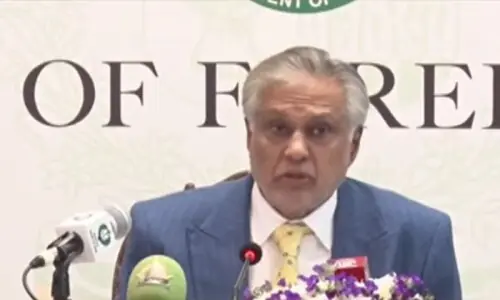• Wheat policy comes under severe criticism in National Assembly
• PTI members stage noisy protest over alleged maltreatment of Bushra Bibi
• Govt, opposition agree on distribution of standing committees
ISLAMABAD: A day after Finance Minister Muhammad Aurangzeb called for broadening the tax net and expressed concerns over the delay in the cases of tax recoveries, the government on Wednesday tabled a bill in the National Assembly to expedite the process of the recovery of over Rs2 trillion held up in litigation before the Appellate Tribunal Inland Revenue (ATIR).
The bill, titled Tax Laws (Amendment) Act 2024 seeking to amend the Sales Tax Act 1990, was laid before the assembly by Law Minister Azam Nazeer Tarar on behalf of the finance minister through a supplementary agenda, amid opposition’s call for delaying the move till the formation of the standing committee on finance.
However, Speaker Ayaz Sadiq advised the treasury and the opposition lawmakers to hold informal meetings to discuss the proposed law which would now be laid before the Senate for submitting its recommendations in 10 days.
President Asif Zardari has already summoned the first regular session of the Senate on Thursday.
Besides introduction of the bill, the house witnessed a heated discussion on the issue of the refusal of the government to procure wheat at the announced support price due to the decision of the caretaker government to allow import of the commodity despite expected bumper crop and a noisy protest by the opposition Pakistan Tehreek-i-Insaf (PTI) members over the alleged maltreatment of Bushra Bibi.
In a significant development, the government and opposition members informed the house that they had reached an understanding on the formula for the distribution of the standing committees and that they would try to finalise the formation of the committees in a meeting on Thursday.
Legislation
Giving salient features of the proposed Tax Laws (Amendment) Act, the law minister said there were pending tax cases amounting to Rs2,700 billion across various appellate forums, including commissioners’ appeals, ATIR and various courts.
Mr Tarar said that presently 72,000 cases were pending at various forums and there were only 20 ATIRs whose number was now being increased to 35 to expedite the process.
The minister said that the government had abdicated many of its powers through the bill and now the prime minister would have no role in the appointment of the ATIR members. These members, equivalent to the high court judges, he said, would be appointed through an open competition and conduction of tests through reputable institutions like IBA, NUST and LUMS.
He said through the proposed legislation, various tax forums had been readjusted keeping in view the amount. He said the cases of tax liabilities up to Rs10 million would continue to be heard by the commissioners whereas the other cases would be referred to the ATIR.
He explained that the duration of the appeal in high courts had been reduced from 90 days to 30 days with the provision that the tax payer would automatically get a stay to prevent immediate withdrawal of the amount from his account. He said the government had made an effort to create a balance so that the rights of the tax payers were protected.
The minister said the bill had been drafted in consultation with the Tax Bar Association and asked the opposition members to give suggestions to improve it.
Standing committees
The members from the treasury and the opposition benches informed the house that they had agreed on the formula for the distribution of the committees and that the process would be completed in another meeting scheduled to be held on Thursday (today).
The issue had been raised by MQM’s Khawaja Izharul Hassan on a point of order in which he had expressed his concerns over the delay in the formation of the committees which, according to him, had started to affect the legislative business of the house.
Dr Tariq Fazal Chaudhry of the PML-N, who is a part of the process, informed the house that the government had agreed to give chairmanship of 10 standing committees to the opposition. He said that they would soon reach an understanding as to which committees should be handed over to the opposition parties keeping in view the past traditions.
Meanwhile, sources in the government told Dawn that besides chairmanship of 10 committees, the government had also agreed to hand over the Public Accounts Committee (PAC) also to the PTI as per the parliamentary tradition, though there was no constitutional bindings.
On the other hand, the National Assembly Secretariat through a statement rebutted reports in some media claiming that the speaker did not want to make PTI’s Sher Afzal Marwat as the PAC chairman. It said that no decision had been made in this regard and traditionally the chairmen of the committees were finalised through consultations between the government and the opposition.
PTI’s protest
Speaking on a point of order, Leader of the Opposition Omar Ayub alleged that Bushra Bibi had been poisoned in jail and that the government was hiding the matter through her false medical reports. He demanded that the doctors of Shaukat Khanum Hospital should be provided an access to Bushra Bibi and to conduct the tests.
Law Minister Azam Nazeer Tarar said that it was on the PTI’s demand that the medical tests of Bushra Bibi were conducted in one of the best private hospitals of Islamabad, instead of any government hospital, adding that there was no reason for referring Bushra Bibi to another hospital of PTI’s choice as all her tests were clear.
Wheat procurement
The NA witnessed a heated debate on points of order on the issue of the wheat procurement, criticising the government for not procuring wheat causing difficulties for the farmers. The issue was raised by PPP’s Nafisa Shah on a point of order.
The members sitting on the opposition as well as treasury expressed their concerns over the government’s refusal to purchase wheat and for allowing import of the commodity despite having a bumper crop.
Opposition’s Sheikh Waqas Akram warned the government that soon the farmers would be in the streets and the rulers would not be able to face the brunt.
Minister for National Food Security Rana Tanveer admitted that it was the wrong decision of the caretaker government to allow import of the wheat, stating that they would write letters to the provincial governments to procure maximum wheat from the farmers.
Published in Dawn, April 25th, 2024






























